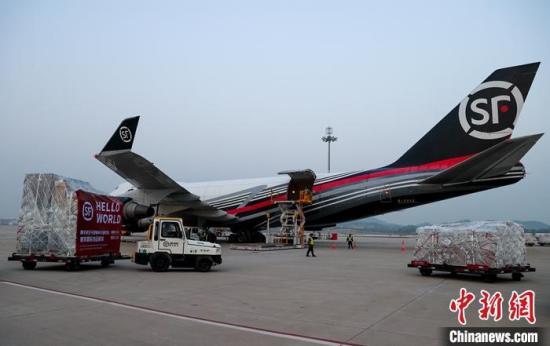Chinese carriers launch 117 new international air cargo routes in H1
Chinese carriers launched more than 100 international air cargo routes in the first half of this year, with the majority focusing on Asia and Europe and extending the global cargo network, industry data showed on Wednesday.
As of the end of June, a total of 117 international air cargo routes had been opened nationwide in the first half of this year, with more than 233 round-trip flights added per week, CCTV News reported on Wednesday, citing data from the aviation logistics branch of the China Federation of Logistics and Purchasing.
In terms of route structure, there are 54 routes to Asia, 45 routes to Europe, and 12 routes to North America. The cargo transported is mainly composed of cross-border e-commerce goods, electronic products, auto parts, and fresh goods.
On June 26, SF Express opened an international cargo route from Kunming, Southwest China's Yunnan Province, to Colombo, the capital of Sri Lanka. This is the first scheduled all-cargo route in China that flies directly to Sri Lanka, according to information SF Express shared with the Global Times on Wednesday.
The route is scheduled to operate twice a week, and is expected to provide more than 110 tons of air transport capacity every week.
The exports are electronic products, mechanical parts, textiles, cross-border e-commerce packages and flowers, while imports focus on Sri Lankan black tea, spices and other specialty agricultural products, as well as Indian electronic products and Maldivian seafood transited through Colombo, SF Express said.
On June 25, an Air China passenger aircraft carrying passengers and about 20 tons of commercial cargo landed at the Jose Marti International Airport in Havana, the capital of Cuba, marking the official launch of the Beijing-Havana cargo route. The cargo service will operate using Air China's regular passenger flights between Beijing and Havana every Wednesday and Saturday.
Despite macroeconomic pressures, the cross-border e-commerce sector in China has shown strong resilience and potential. Global consumers are increasingly purchasing directly from overseas sellers, driven by rising demand for better product variety and value, according to a document that FedEx shared with the Global Times.
Meanwhile, cross-border e-commerce in China is experiencing a powerful shift. Once dominated by first-tier cities like Shanghai, Beijing, Shenzhen and Guangzhou, the momentum has now moved to second- and third-tier cities, which include many provincial capitals, sub-provincial cities, and large prefectural-level cities with significant regional influence, according to FedEx. These emerging hubs are redefining global trade routes with the help of smart logistics solutions and a rapidly maturing supply chain in China, said FedEx.
Riding the wave of growth, foreign businesses are also tapping into the rapid development of China's cross-border logistics industry, with new routes continuously being launched.
Recently, an Ethiopian Airlines cargo plane carrying 102 tons of goods took off from Urumqi Tianshan International Airport at sunrise, marking the official launch of the highly anticipated Urumqi-Addis Ababa cargo route. This is not only the first direct freight corridor between Northwest China's Xinjiang Uygur Autonomous Region and the African continent, but also a significant milestone in deepening the China-Africa comprehensive strategic partnership in the new era and advancing high-quality Belt and Road cooperation, according to a press release that Ethiopian Airlines on Wednesday.

